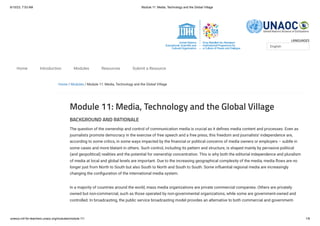
MIL for Teachers Module 11: Media, Technology and the Global Village
- 1. 6/10/23, 7:53 AM Module 11: Media, Technology and the Global Village unesco.mil-for-teachers.unaoc.org/modules/module-11/ 1/6 LANGUAGES Home / Modules / Module 11: Media, Technology and the Global Village Module 11: Media, Technology and the Global Village BACKGROUND AND RATIONALE The question of the ownership and control of communication media is crucial as it defines media content and processes. Even as journalists promote democracy in the exercise of free speech and a free press, this freedom and journalists’ independence are, according to some critics, in some ways impacted by the financial or political concerns of media owners or employers – subtle in some cases and more blatant in others. Such control, including its pattern and structure, is shaped mainly by pervasive political (and geopolitical) realities and the potential for ownership concentration. This is why both the editorial independence and pluralism of media at local and global levels are important. Due to the increasing geographical complexity of the media, media flows are no longer just from North to South but also South to North and South to South. Some influential regional media are increasingly changing the configuration of the international media system. In a majority of countries around the world, mass media organizations are private commercial companies. Others are privately owned but non-commercial, such as those operated by non-governmental organizations, while some are government-owned and controlled. In broadcasting, the public service broadcasting model provides an alternative to both commercial and government- English Home Introduction Modules Resources Submit a Resource
- 2. 6/10/23, 7:53 AM Module 11: Media, Technology and the Global Village unesco.mil-for-teachers.unaoc.org/modules/module-11/ 2/6 owned media. A positive development is the growing popularity of community-owned media, which involve local residents in content development and give a voice to marginalized sectors of society. Technological advances in a worldwide market economy have encouraged the growth of global media companies, referred to as transnational media conglomerates. Their power and influence extend over geographic, economic, and political barriers. Global media companies include those that operate at the regional level. Convergence, despite antitrust regulations, has also facilitated media mergers and acquisitions at the national and global level. Many mass media organizations are establishing alliances with companies doing business in telecommunications, web applications and entertainment (movies and video games), etc. The new companies created by these coalitions have become more powerful as their messages, images and voices can now be transmitted globally and reach even the remotest villages through diverse platforms – print, broadcast and digital. The emergence of global media presents both challenges and opportunities. Some communication scholars have warned of threats of cultural homogeneity, but the same media tools offer opportunities for cultural diversity and pluralism (i.e. it is now easier to produce, share, and exchange local media content). The global media also have the capability and resources to set higher standards of professionalism. Consequently many local media outlets are forced to become more competitive by improving the quality of their programming. Moreover, development issues that have a worldwide impact, such as climate change, pandemics or threats to biodiversity, can be effectively communicated by the global media. It is also acknowledged that many stories hidden from local and national audiences due to politico-economic constraints, are revealed to a worldwide audience by independent global media. The impact of media industries on the political setting is also changing. With new media technologies, there is now a greater two- way flow of information within and outside national boundaries, as well as broader platforms for public discourse. All these cultivate tolerance and understanding. The paramount issue is: How can the media help promote a wider range of options, choices and freedom? The prevailing commercial media system deserves particular attention because advertising remains its main source of revenue. How can media organizations keep their independence and the public’s trust, while remaining viable (profitable) and sustainable (in terms of operations)? The impact of overemphasizing either factor should be considered. This module ends on an optimistic note, with a discussion on alternative media, especially those in small communities, operating in today’s global media landscape. The increasing number of news media channels is also discussed, as these offer alternatives to
- 3. 6/10/23, 7:53 AM Module 11: Media, Technology and the Global Village unesco.mil-for-teachers.unaoc.org/modules/module-11/ 3/6 Unit 1: Media Ownership in Unit 1: Media Ownership in Today’s Global Village Today’s Global Village Unit 2: Socio-Cultural and Unit 2: Socio-Cultural and Political Dimensions of Political Dimensions of Globalized Media Globalized Media Unit 3: Commoditization of Unit 3: Commoditization of Information Information Unit 4: The Rise of Unit 4: The Rise of Alternative Media Alternative Media the dominance of a few, including online news sites. Community media can be set up in schools, communities, workplaces, etc. and are alternative to larger media outlets. These ‘small’ media channels promote the right to information and offer local people a voice of their own. RESOURCES FOR THIS MODULE Birdsall, W. F. (N.D.), The Internet and the Ideology of Information Technology. (Accessed 2 september 2009.) Fidler, R. 1997. Media Morphosis: Understanding New Media. California. Pine Forge Press. Green, L. 2002. Communication, Technology, and Society. London, Sage Publications; Habermas, J. 1989. The Structural Transformation of the Public Sphere, trans. Thomas MacCarthy. Cambridge, Polity Press. Habermas, J. 1994. Citizenship and National Identity. Steenbergen, B.V. (Ed.). The Condition of Citizenship. London, Sage Publications. Littlejohn, S. W. and Foss, K.A., 2008. Theories of Human Communication (9th ed). Belmont, California; Thomson Wadsworth. Marris, P. and Thornham S. (Eds.). 2002. Media Studies: A Reader (2nd ed.). New York, New York University Press. Pavlik, J. V. 1998. New Media Technology: Cultural and Commercial Perspectives (2nd ed.). Boston, MA; Allyn and Bacon. Servaes, J. 2003. Approaches to Development. Studies on Communication for Development. Paris, Communication and Information Sector – UNESCO. Stevenson, N. 1995. Understanding Media Cultures: Social Theory and Mass Communication. London, Sage Publications. Sussman, G. and Lent, J. (Eds.). 1991. Transnational Communications Wiring the Third World. Newbury Park, California; Sage Publications. RESOURCES FOR THIS MODULE
